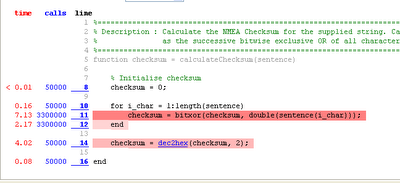I often see people asking about network communications on the MATLAB Newsgroup. Often this is for the communication between instances of MATLAB.
Using the ability to call Java directly from within MATLAB, I'm going to provide a short example of a client/server written solely in MATLAB and usable from Release 14 onwards (possibly even earlier).
The example is available on the Mathworks File Exchange: Simple TCP/IP Socket Comms Example
I'm working on a little TCP/IP comms library at the moment using these techniques. It will provide a nice layer of abstraction and allow you to use Sockets as you would in other programming languages (as well as one can in a single thread). Keep an eye out for it on the File Exchange.
Interpreted Java?
Amazingly we can execute Java code, even from within the Command Window without the need to compile. For example, the traditional example:
>> import java.lang.*
>> System.out.println('Hello World')
Hello World On the server side we use (unsurprisingly) a ServerSocket, which once a client has been accepted, provides a Socket around which we wrap a DataOutputStream to which we can write data.
On the client side we use a Socket to connect to the specified host and port which provides us an InputStream which we wrap in a DataInputStream to read data from.
The code for the example server and client is outlined below.
client.m
% CLIENT connect to a server and read a message
%
% Usage - message = client(host, port, number_of_retries)
function message = client(host, port, number_of_retries)
import java.net.Socket
import java.io.*
if (nargin <>
number_of_retries = 20; % set to -1 for infinite
end
retry = 0;
input_socket = [];
message = [];
while true
retry = retry + 1;
if ((number_of_retries > 0) && (retry > number_of_retries))
fprintf(1, 'Too many retries\n');
break;
end
try
fprintf(1, 'Retry %d connecting to %s:%d\n', ...
retry, host, port);
% throws if unable to connect
input_socket = Socket(host, port);
% get a buffered data input stream from the socket
input_stream = input_socket.getInputStream;
d_input_stream = DataInputStream(input_stream);
fprintf(1, 'Connected to server\n');
% read data from the socket - wait a short time first
pause(0.5);
bytes_available = input_stream.available;
fprintf(1, 'Reading %d bytes\n', bytes_available);
message = zeros(1, bytes_available, 'uint8');
for i = 1:bytes_available
message(i) = d_input_stream.readByte;
end
message = char(message);
% cleanup
input_socket.close;
break;
catch
if ~isempty(input_socket)
input_socket.close;
end
% pause before retrying
pause(1);
end
end
end
% SERVER Write a message over the specified port
%
% Usage - server(message, output_port, number_of_retries)
function server(message, output_port, number_of_retries)
import java.net.ServerSocket
import java.io.*
if (nargin <>
number_of_retries = 20; % set to -1 for infinite
end
retry = 0;
server_socket = [];
output_socket = [];
while true
retry = retry + 1;
try
if ((number_of_retries > 0) && (retry > number_of_retries))
fprintf(1, 'Too many retries\n');
break;
end
fprintf(1, ['Try %d waiting for client to connect to this ' ...
'host on port : %d\n'], retry, output_port);
% wait for 1 second for client to connect server socket
server_socket = ServerSocket(output_port);
server_socket.setSoTimeout(1000);
output_socket = server_socket.accept;
fprintf(1, 'Client connected\n');
output_stream = output_socket.getOutputStream;
d_output_stream = DataOutputStream(output_stream);
% output the data over the DataOutputStream
% Convert to stream of bytes
fprintf(1, 'Writing %d bytes\n', length(message))
d_output_stream.writeBytes(char(message));
d_output_stream.flush;
% clean up
server_socket.close;
output_socket.close;
break;
catch
if ~isempty(server_socket)
server_socket.close
end
if ~isempty(output_socket)
output_socket.close
end
% pause before retrying
pause(1);
end
end
end% Instance 1
>> message = char(mod(1:1000, 255)+1);
>> server(message, 3000, 10)
Try 1 waiting for client to connect to this host on port : 3000
Try 2 waiting for client to connect to this host on port : 3000
Try 3 waiting for client to connect to this host on port : 3000
Try 4 waiting for client to connect to this host on port : 3000
Client connected
Writing 1000 bytes
% Instance 2 (simultaneously)
% NOTE: If the 'server' was runnning on a non local machine, substitute its IP address
% or host name here:
% data = client('10.61.1.200', 2666); % To connect to server at IP 10.61.1.200:2666
>> data = client('localhost', 3000)
Retry 1 connecting to localhost:3000
Retry 2 connecting to localhost:3000
Connected to server
Reading 1000 bytes
data =
!"#$%&'()*+,-./0123456789:;<=>?@ABCDEFGHIJKLMNOPQRSTUVWXYZ[\]^_`abcdefghijklmnopqrstuvwxyz{|}~
!"#$%&'()*+,-./0123456789:;<=>?@ABCDEFGHIJKLMNOPQRSTUVWXYZ[\]^_`abcdefghijklmnopqrstuvwxyz{|}~
!"#$%&'()*+,-./0123456789:;<=>?@ABCDEFGHIJKLMNOPQRSTUVWXYZ[\]^_`abcdefghijklmnopqrstuvwxyz{|}~
!"#$%&'()*+,-./0123456789:;<=>?@ABCDEFGHIJKLMNOPQRSTUVWXYZ[\]^_`abcdefghijklmnopqrstuvwxyz{|}~

